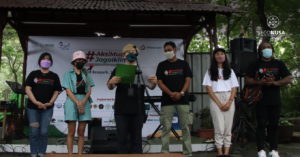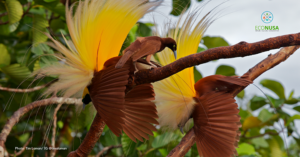
Every element of stakeholder has significant role to Indonesian forests sustainability. The government plays its role as a regulator ensures the sustainable utilization of natural resources. Business person complies with the designated rules for their products that are not deemed one of the factors causing forests degradation.
When both stakeholders fail to act as they should be, the community has major roles to call the government and business people to apply sustainability principles in natural resources management. As a consumer, for instance, the community could question the raw materials of a product.
“As a consumer we should care about what happens to our forests or environment. When we use shampoo which is produced by using palm oil, it might be produced by a company that cut the forests carelessly,” said EcoNusa CEO Bustar Maitar on a virtual Road to Campus discussion entitled “How Good is Your Cunsumer Goods? Menilik Keterkaitan Barang Konsumsi terhadap Kelestarian Hutan Papua” on Friday (20/11/2020).
Bustar said the high demand of palm oil has driven corporate to increase production. Unfortunately, the rising production capacity is done by expanding plantation areas by clearing primary forests. The declining forests in Sumatera and Kalimantan are the examples of deforestation due to land use change into plantation.
Besides, despite the acquired concessions from government, some companies commits irresponsible measures by burning forests before planting. In 2015, the world blamed Indonesia for 2.6 million hectares of forests fire. Having probed the case, 127 perpetrators and 10 companies were named as suspects for the incidents.
Forests in the eastern of Indonesia serve as the last frontier of primary forests in Indonesia. There are 38 percent of primary forests or 31.4 million hectares remaining in Tanah Papua. Here is the home for 20,000 vegetation species, 602 types of birds, 125 mammalians and 223 reptilians. Forests in Tanah Papua are the source of life for the local community.
“Even the weakest faith, one should ask to the customer care on their product. You have the rights to know. Otherwise, you might become part of the ecological wreckage by letting it happen,” said Bustar.
He asserted that critical stance to palm oil estate that degraded environment does not have any connection to nationalism. Nearly 50 percent of palm oil estate operating in Indonesia belongs to foreigners. Even smallholders every so often do not get any benefit from palm oil estate.
“Never go wrong for whom we struggle. What we fight for is the neighbouring country, not our country. What we fight for is environment, our community and smallholders who have never got any benefits from palm oil estate,” Bustar said.
Editor: Leo Wahyudi




